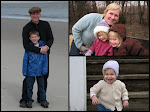I have to say that traveling by car in Africa is at times terrifying. “Might makes right” on the roads, and buses and vans doubling as taxis barrel down the road, expecting you to move out of the way. This includes if they are coming the opposite direction and decide to pass a vehicle that is driving merely 70 mph. If you enjoy life, you’re required to swerve out of the way, making sure you don’t sideswipe any of the multitudinous pedestrians, bicyclists, and boda-boda (motorcycle) drivers. As I said of the matatus in Mombasa, I now say of any driver in Africa – you must either be surprisingly skilled or ludicrously lucky to drive along these roads.
That said, it’s time for some reflections on Bishop Barham in Kabale:
- There is a reason they call Kabale “the Swiss Alps of Africa.” The green hills curve invitingly into the sky, then dip back down into often lushly cultivated farm lands. There are many forests surrounding the area, some of which farther on are home to silverback gorillas. Coming into Kabale you cross the equator, so you have entered into the southern hemisphere. Because of the altitude, however, the air is famously cool year round. About 20 minutes drive from the school is a lake where people from the school often take a retreat, and I know that the staff took me there in order to increase the woo factor.
- The principal of the school, the Rev. Dr. George Tibeesigwa, was beyond gracious. If you remember from a previous posting, I actually met him in Kampala. He called us several times on the round to and from Kabale to mark our progress, and his staff was ready to greet us with immense warmth. One thing is very evident about this school – the leaders are committed to team ministry, and their community with each other seems to be deep and genuine. George is a man of vision and influence, but he exercises his authority by loving and supporting those who are under him.
- The school is larger and more significant than I had realized. They have about 600 registered students, 20 full time faculty, and another 10 or so part-time faculty. The school has grown with surprising speed in the past several years, and is closely connected with Uganda Christian University in Kampala. Their theological college is only one part of the university.
- Another significant aspect of the school is its historical ties to the East African Revival. I’ll give a sketch of this important movement another time, but for now it’s important to know that the revival began in Kabale and spread outward from there. At least one result that I sensed at the school is that the faculty consider the spiritual life to be more significant than the academic one. A clear example came when I asked their academic dean what he looks for in the faculty he hires. “Two things first of all: the quality of his spiritual life, and his commitment to teaching.”
- Another plus: our very own avocado tree. The house we where we would live is the principal’s current home – he is about to vacate that one and move into a newly constructed one.
- Kabale is quite remote. There are many western luxuries available in Kampala that are not accessible in Kabale. There is the potential to feel isolated and lonely out there, although there is supposed to be an ex-patriot community of some size. The only other westerners currently on the school staff are two German couples, one older and one younger.
- The teaching load would be rather heavy, although the principal said that he gives first-timers a lighter load. The resources are again limited, but their librarian is doing an excellent job with what she has. There is also an expectation that I would help out with the technology of the place. (Frederick let slip the secret I’ve been trying to keep hid, namely, that I know anything about computers.)


No comments:
Post a Comment